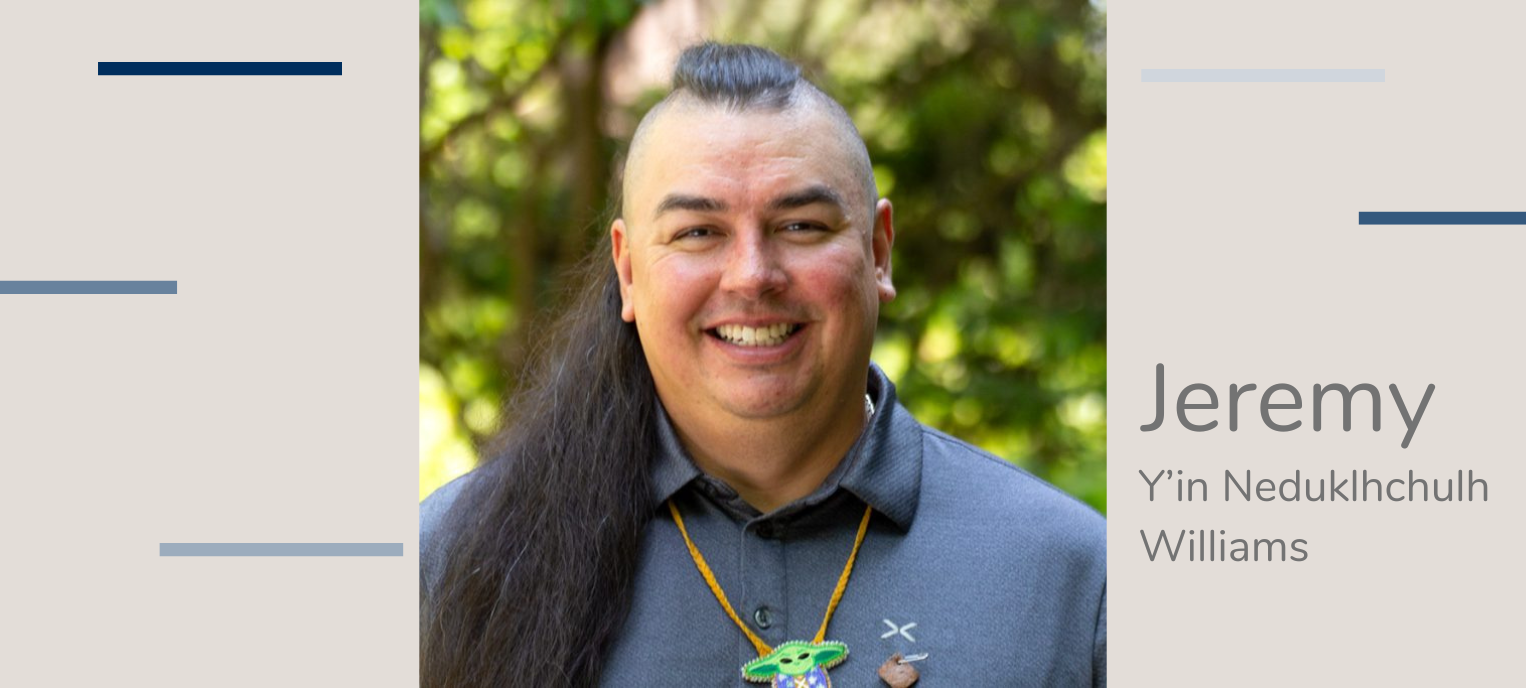An integral part of the Aboriginal Steering Committee (ASC) at HELP, Jeremy Y’in Neduklhchulh Williams is a proud member of the Ned’uten Dakelh/Lake Babine Nation, originating from the Raven clan and sitting as a guest of the Fireweed clan in Wet’suwet’en and Gitxsan territory.
From Education to Advocacy: A Path to Public Service
After completing a Bachelor’s degree in First Nations Studies and Political Science as well as a Master’s Degree in Education-Counselling, Jeremy returned to his reserve community and re-entered the workforce as a well-educated green horn eager to put his education into action. He has pursued his passion for supporting children and youth for a number of years in the public sector, including a role with the BC Representative for Children & Youth and supporting Indigenous Child & Family Service Agencies at the Ministry for Children & Family Development.
Jeremy’s journey to the ASC at HELP was influenced by a dear friend, Zoe LeFevre, a Namgis First Nation member with a Master of Social Work. “She suggested the group as a potentially good fit for my passion and interests,” Jeremy recalls. Initially, he felt out of his depth but was soon captivated by the diverse cultural perspectives and the strength of ASC members. “I saw the potential for HELP’s work to positively impact First Nations communities,” he shares, noting how the committee’s inclusive environment and shared wisdom continue to inspire him.
Currently, Jeremy works at the BC Ministry of Indigenous Relations & Reconciliation (MIRR), and is deeply committed to advancing reconciliation with BC’s First Nations. “Working for the Public Service, I am keenly aware of the outsized impact both Provincial and Federal governments have on BC First Nations people,” he explains. His role involves addressing institutional and systemic issues that adversely affect First Nations peoples, supporting the 89 commitments in the 2022-27 BC UNDRIP Action Plan, and other critical work within the Reconciliation Transformation Strategies Division.
Empowering Communities via Cultural Restoration
One of the aspects Jeremy loves most about his work is the challenge of confronting and dismantling colonial systems from within — more specifically, he says he loves “handing parts and pieces over to First Nations to rebuild what was historically taken from them so they can better support their children, families, and communities.” He finds great satisfaction in engaging with community leaders and hearing their needs and aspirations. A notable accomplishment was aiding former Premier Horgan, and the Nisga’a Nation, in the rematriation of the Ni’isjoohl pole to Nisga’a Nation territory, a poignant act of cultural restoration. “My team at MIRR supports BC First Nations to have cultural items and ancestors returned from international museums, which is incredibly important and exciting work,” he adds.
Supporting First Nations Leadership and Systemic Change
Despite the numerous barriers in his path, Jeremy remains hopeful and driven in his belief that these systems can and will be changed. He emphasizes the importance of increasing First Nations representation in leadership positions within the public service and corporate sectors. “When I started in government, there were not many leadership positions filled by First Nations staff,” he recalls. Today, he proudly works alongside brilliant First Nations Matriarchs who are deeply rooted in their culture and dedicated to addressing systemic issues. Jeremy actively supports future leaders through initiatives like the Indigenous Leadership & Mentorship Program facilitated by the BC Public Service Agency. “I look forward to supporting future leaders, so folks can see that they belong in leadership, and executive positions, and climb up the corporate ladders if they so choose,” he adds.
At HELP, Jeremy values the practical impact of research on policy and programming. “I am not an academic, but I appreciate the passion and enthusiasm for research that helps shed light on how children and youth are doing across the province,” he says. He sees the long-standing collaboration between HELP and the ASC as a form of academic reconciliation, acknowledging the foundational work of Dr. Jesse Nyberg, Ms. Diana Elliott, and Dr. Clyde Hertzman. “I’m proud that the ASC has helped support the development of new measurement instruments at HELP and encouraged UBC to engage more effectively with BC First Nations.”
Jeremy’s work, both within and outside the ASC, seeks transformative change for First Nations, Inuit, and Métis children and families in BC and beyond. He aspires to dismantle colonial harms and empower First Nations communities to live their best lives, free from colonial influence and harm. “I hope my work helps to support First Nations to retake and revitalize the roles that were stripped from them via colonization,” he states. Looking ahead, Jeremy envisions a future where Provincial Child Welfare systems (which currently have more First Nations children in care now than went to Residential Schools) are replaced by prevention-based systems managed by First Nations, Inuit, and Métis. “If we can move towards these preventative systems and away from downstream child protection systems, we will be a much better country.”
This story was updated on September 18, 2024 to reflect Jeremy’s legal name change to Jeremy Y’in Neduklhchulh Williams.
